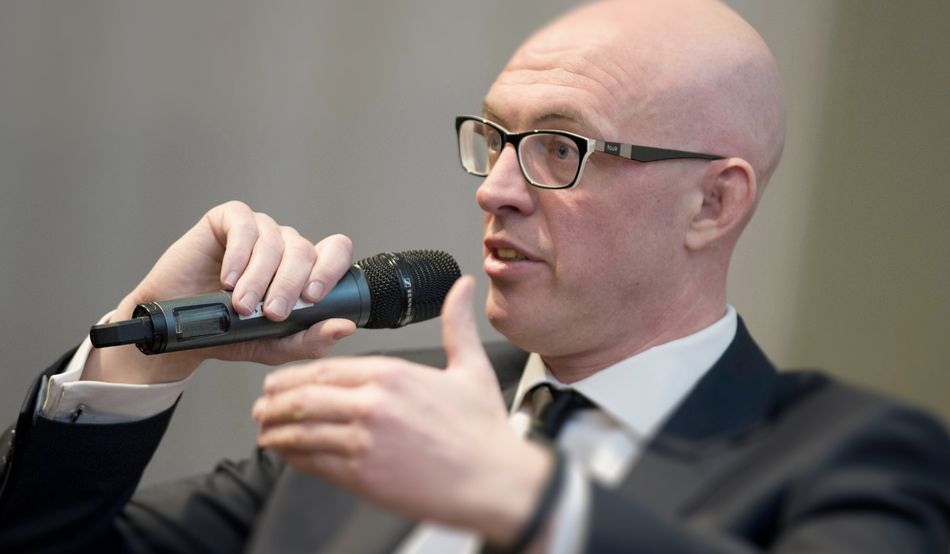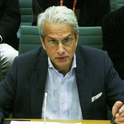There is a new permanent secretary in Whitehall, and his name is David Dinsmore. No reason why you should have heard of him: he’s been toiling away on behalf of Rupert Murdoch for nearly 22 years and Rupert generally likes his employees to keep their heads down.
But for two and a half years Dinsmore was editor of the Sun newspaper, and you have to admit that the idea of a former editor of the Sun becoming a permanent secretary is enough to raise an eyebrow.
Something slightly similar was tried before when David Cameron asked former News of the World editor Andy Coulson to accompany him into Downing Street as his spokesman. That ended in tears—and with Coulson behind bars.
But you could at least see the logic. Coulson was employed as a spin doctor in the Alastair Campbell/Malcolm Tucker mode. His political sympathies were thoroughly in tune with the Tories, and it was evidently felt he could reach White Van Man, or whatever Fleet Street was then labelling floating working-class voters.
But Dinsmore is being hired at a salary of about £200,000 to head a 6,000-strong team of government communications professionals across 20 departments and 300 other public bodies. They are supposed to behave impartially. They are there to deal in facts, not spin.
Now Dinsmore has, for the past 10 years, been chief operating officer at Murdoch’s UK newspaper operation. Before that, his entire working life was spent in journalism, not comms. And Rupert Murdoch doesn’t hire Sun editors to behave impartially. So, on the face of it, it’s not easy to see why Dinsmore fitted the bill.
The head-hunters will have done their due diligence. They will have been conscious that Dinsmore was in senior editorial roles at the Sun when, it is alleged (and only partially denied by the company), that phone-hacking and other unlawful ways of obtaining personal information were rife. No allegations of wrongdoing were levelled against Dinsmore.
They will have come across an Independent story in April 2015 revealing that Rupert Murdoch personally berated Dinsmore for not doing enough to stop Labour, under Ed Miliband, from winning the coming general election. The report said Murdoch instructed Sun journalists to be much more aggressive in their attacks on Labour and the man who is now energy secretary.
The Sun needed no second telling. According to analysis by the Media Standards Trust, the paper carried 102 anti-Labour editorials compared to just four critical of the Conservatives. There were 35 leaders supportive of the Tories. Via a news agency, the paper offered £100 for Sun readers who had positive stories to tell about the Conservatives.
The head-hunters will know that, although there is no suggestion that he personally endorsed her views, Dinsmore came under fire during the campaign for running a column by Katie Hopkins, which advocated using gunships to stop migrants, whom she likened to cockroaches: “No, I don’t care,” she wrote. “Show me pictures of coffins, show me bodies floating in water, play violins and show me skinny people looking sad. I still don’t care.”
Then the head-hunters will have done their best to get to the bottom of further brushes with Labour in the years when Dinsmore was editing either the Scottish Sun or the Sun itself.
In 2011, then-prime minister Gordon Brown told how he and his wife, Sarah, were reduced to tears in 2006 after learning that the Sun was intending to publish a story saying that their son, Fraser, was suspected to be suffering from cystic fibrosis.
Dinsmore was then editor of the Scottish Sun. In April 2012, it was admitted by News Group’s lawyers that an alleged “confidential source” had been paid £2,000 for the information, but denied that it was obtained from “an employee of the relevant hospital.” This was undermined by the hospital itself, which, a few months later, admitted that the source was probably a member of the hospital staff.
The editor of the Sun at the time, Rebekah Brooks, eventually conceded to the Leveson Inquiry that there could be no justification for publishing information about the medical condition of a child.
Gordon Brown told Leveson: “I am sorry to say that even now the Sun newspaper has not been honest with the truth about how private, personal medical knowledge that could have been known only to a small group of medical professionals apart from our immediate family and which my son had a right to expect would remain confidential was obtained and authenticated.”
Then there was the story of the Sun reporter who was given a suspended jail sentence during Dinsmore’s time as editor, after it was found he’d handled, and searched through, a mobile phone belonging to a Labour MP, Siobhain McDonagh. The phone had been stolen from her car.
Nick Parker, the paper’s chief foreign correspondent, received a three-month sentence suspended for 12 months, after an Old Bailey jury heard how Parker had kept the phone overnight to trawl through McDonagh’s private texts in search of a story. Parker denied doing anything wrong.
The Sun later apologised to McDonagh in the High Court after admitting a “serious misuse of her private information. The paper paid her “very substantial damages.” Parker was welcomed back onto the paper.
That’s quite a back catalogue of events on the watch of the man now being welcomed into Whitehall as a permanent secretary to help a Labour government sharpen up its messaging, and I haven’t even mentioned the Sun’s relationship with Liverpool after the lies it told about Hillsborough. It is not obvious that Labour MPs will want to roll out a red carpet.
Supporters of Dinsmore say he is well-liked by colleagues. It’s argued on his behalf that the Government Communications Agency is currently “moribund” and that he has a track record of successfully transforming print businesses into digital ones.
It’s hard to tell how true this is. His old paper, the Sun, has been in loss since at least 2017, according to the UK Press Gazette—but that is in large part due to enormous pay-outs and legal fees over phone-hacking. The Sun’s betting and gaming division is doing well. The parent company’s big play in linear TV—Talk TV—was a flop.
Now, it is true that Keir Starmer’s government has been generally woeful at communicating its purpose. It is also true that tabloid journalists, at their best, are greatly skilled at simplifying information and putting it across in a compelling way.
But Murdoch’s Sun newspaper was in many ways a rather horrible, secretive, corrupt and toxic culture—the very worst of journalism, obsessed with celebrity and only too willing to act as Murdoch’s attack dog.
News Group Newspapers has lavished hundreds of millions of pounds in settling cases alleging criminal behaviour at the Sun. It took a prolonged legal action from Prince Harry before the company finally apologised for unlawful activities carried out by private investigators on behalf of journalists.
It takes an extraordinary leap of imagination to believe that a man who has spent virtually his entire working life in this culture can, chameleon-like, reinvent himself as the master of straight, impartial government information.
For more than half a century Rupert Murdoch has loomed like a media shaman over British politics. Installing one of his executives to preside as truth-teller in chief over the machinery of government feels like magical thinking. I hope I’m wrong.













